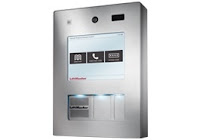Security gates in the "old days" were clunky, prone to failure, and noisy. When the gate would open, you could hear it from a mile away. Today, things are far different. Gates today open smoothly, are extremely reliable, and are quiet. Gates, however, are an electrical and mechanical device. As with all devices, proper preventative maintenance is the key to a long lasting and quiet gate. Here are 6 tips and tricks for reducing noise from gate security systems:
1. The Squeaky Wheel Gets the Grease
The old cliché of "the squeaky wheel gets the grease" holds true. You must lubricate all bearings and movable contact surfaces. Check for areas not normally thought of, such as internal cog and gear mechanisms. Use a lubricant that is rated for heavy duty use, such as wheel bearing grease.
2. Replace Old Motors with New Motor Technology
Motors of old were by their very nature loud and clunky. It’s good to always have a replacement motor on hand for when your motor starts becoming noisier toward the end of its life. For a longer lasting solution, engineers have developed motors that don't use brushes. Brush motors get gummed up and need frequent brush replacement. Brushless motor technology allows for lower maintenance and longer life. The technology also allows for the motor to stay cool and operate more efficiently, resulting in very smooth running and quiet motor. For example, the
Platinum Access Systems gate assemblies use a high torque brushless motor.
3. Replace Chains with Drive Belts
The traditional method of moving a gate was by chains. These were loud and clunky. Today, various belt driven systems are available, which are far quieter and smoother running. Today's belt materials can withstand outdoor usage and will not deteriorate.

4. Replace Above-ground Drives with Underground Systems
Above-ground drive systems are also noisy. An underground system blocks noise because the ground itself absorbs all the sound waves. One such system is the
Platinum Access Systems underground swing gate mechanism. If you replace an above-ground with an underground system, preventative maintenance is reduced since the mechanism is not exposed to the elements.
5. Debris Removal and Housekeeping
As part of a preventative maintenance program, you should inspect the gates and mechanisms for debris. Gates, mechanisms and operators lacking covers can accumulate dust, grit, and rainwater seepage. Any form of debris can slow down the gate system and result in unwanted noise from the blockage. Clear out debris as needed, and if you find a damp area, weatherproof it so no moisture gets in.
6. Bird Nest Prevention
Oftentimes, birds will build nests in sheltered areas, such as mechanism covers. If there's a small entrance hole, they'll find it. A bird's nest will eventually disintegrate, spreading grass, rocks and grit into the mechanism. To prevent this, make sure all large openings are closed off. If you find a bird's nest, observe it for a while and find out where the birds are getting in so that you can block it from future nests.
Gates used to be loud and obnoxious. Today, gates are an unobtrusive way to ensure security of a parking area or home. Yes, security gates have been refined to a science, and with today's new brushless motors and advanced materials, gates are quiet, smooth running, and practically maintenance free. If you still have a noisy gate after following these tips, contact the gate security experts at
the PSS Store for assistance by calling 1-800-676-4909.









